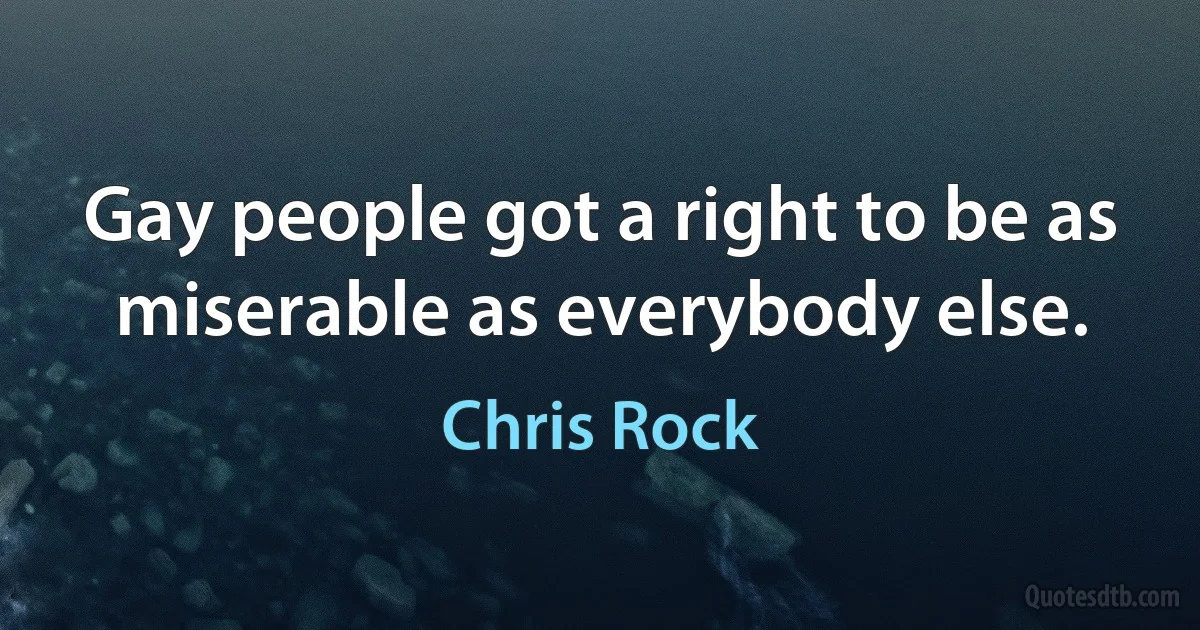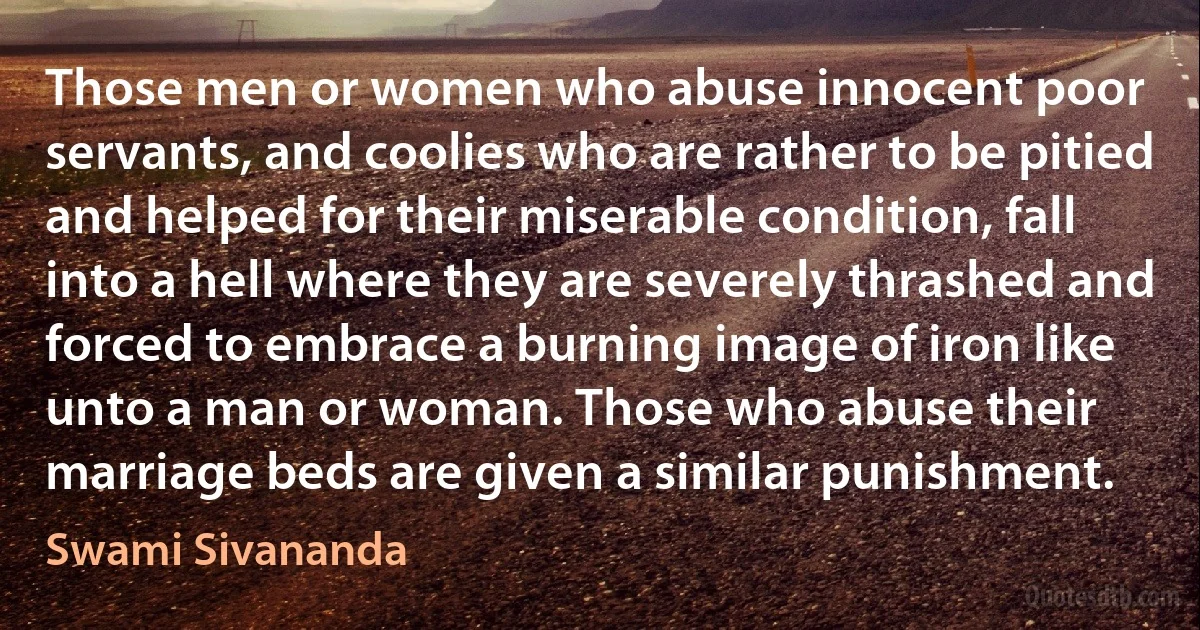Miserable Quotes - page 14
In terms of the big decisions before the Government, he was incapable of making them. He, as a seasoned politician from the TV cameras could turn it on, but his demeanour behind closed doors was absolutely miserable, irritated. If I was going to summarise it: personally miserable, politically paralysed.

Julia Gillard
From the invention of the cotton-gin slavery became a progressive system - not passively tolerated as in process of extinction, but actively striving for development and extension. It became a conscious political power. It made no offensive professions. It still deprecated itself as an evil, so difficult to deal with, and, with an adroit allusion to Ham and Onesimus, it smoothed the ecclesiastical conscience of the country and only asked to be let alone. And it was let alone. The War of 1812, and the consequent commercial confusion and renewed devotion to trade, held the country torpid upon the subject. If anybody looked at slavery inquisitively, it folded its hands demurely upon its breast and said, 'I am such a dreadful thing! How unfortunate that I should exist! What can be done with me? Just please to let me alone, that is all I want. A leper, you see; a miserable leper!

George William Curtis
At the foot of the cross, in all humility and in all adoration, we have learned at once the depth and the height of human nature; we have learned to think all wisdom but foolishness for the knowledge of Christ; all purity but sin, unwashed by His atonement; all hope in earth, of all hopes the most miserable, but in the faith of His most blessed resurrection; content to bear the struggles of life, at His command; and submitting to the grave, with a consciousness that it can sting no more.

George Croly
Q: You seem relatively upbeat and sociable. It's funny, because I've always had this idea of you, like, always crying in the dark.
A: Most people do.
Q: Do you care about that?
A: Oh, no. It doesn't bother me. Whatever people think of me is fine, however they want to envision me. I find it curious. I'm always intrigued by who people think I am and the persona they have created for me, what they think I'm into, what they think I'm not into. But I certainly understand that consideration, that I would be a bleak and miserable person, because a lot of my lyrics are very despondent. Luckily, I have the music to use as catharsis. If I didn't, I might spend more time sitting and crying in a corner than I need to. Also, I think manners are very important. To be a sullen rain cloud when conversing with someone, be they your friends or a journalist, I think is inappropriate.

Davey Havok
To a clergyman lying under a vow of chastity any act of sex is immoral, but his abhorrence of it naturally increases in proportion as it looks safe and is correspondingly tempting. As a prudent man, he is not much disturbed by incitations which carry their obvious and certain penalties; what shakes him is the enticement bare of any probable secular retribution. Ergo, the worst and damndest indulgence is that which goes unwhipped. So he teaches that it is no sin for a woman to bear a child to a drunken and worthless husband, even though she may believe with sound reason that it will be diseased and miserable all its life, but if she resorts to any mechanical or chemical device, however harmless, to prevent its birth, she is doomed by his penology to roast in Hell forever, along with the assassin of orphans and the scoundrel who forgets his Easter duty.

H. L. Mencken
We wish in our country that morality may be substituted for egotism, probity for false honour, principles for usages, duties for good manners, the empire of reason for the tyranny of fashion, a contempt of vice for a contempt of misfortune, pride for insolence, magnanimity for vanity, the love of glory for the love of money, good people for good company, merit for intrigue, genius for wit, truth for tinsel show, the attractions of happiness for the ennui of sensuality, the grandeur of man for the littleness of the great, a people magnanimous, powerful, happy, for a people amiable, frivolous and miserable; in a word, all the virtues and miracles of a Republic instead of all the vices and absurdities of a Monarchy.

Maximilien Robespierre
Neither the planters nor the Colonization Society, seem to ask what right we have to remove people from the places where they have been born and brought up, -where they have a home, which, however miserable, is still their home, -and where their relatives and acquaintances all reside. Africa is no more their native country than England is ours, -nay, it is less so, because there is no community of language or habits; -besides, we cannot say to them, as Gilpin said to his horse, "'Twas for your pleasure you came here, you shall go back for mine."

Lydia Maria Child
When Reagan fired the striking air traffic controllers in 1981, he told America he was literally willing to kill us all if we didn't give in to his wealth-transfer plan. It was so shocking that it worked. The air controller's union broke- and so did a whole way of life. Thanks to Ronald Reagan, we are all miserable wage slaves, or schoolyard wretches being pressed and prepared for life in the office world. There is no other choice but that, or death. The way this country supplicated before Reagan's corpse, elevating him to a kind of Khomeini status with the seven-day funeral and the endless orations about his humanity, his intelligence, and how wonderfully simple life was under his reign, only reinforced the most disturbing conclusion that I was reaching as I wrote this book: that Americans have become the perfect slaves, fools and suckers, while a small elite is cackling all the way to the offshore bank.

Mark Ames
It's widely accepted today that high schools are miserable, nerve-pinching stress machines. They are governed by dim hypocrites; the climate favors the cruelest and shallowest students, and many, if not most students, are constantly suppressing a burning sense of injustice, shame, and powerlessness.

Mark Ames
We all know the beautiful hymn commencing with the cheerful line: "Hark from the tombs, a doleful sound." Nothing could have been more appropriate for children. It is well to put a coffin where it can be seen from the cradle. When a mother nurses her child, an open grave should be at her feet. This would tend to make the babe serious, reflective, religious and miserable.

Robert G. Ingersoll

![Of all the religions ever devised by the great practical jokers of the race, [Christianity] is the one that offers most for the least money, so to speak, to the inferior man. It starts out by denying his inferiority in plain terms: all men are equal in the sight of God. It ends by erecting that inferiority into a sort of actual superiority: it is a merit to be stupid, and miserable, and sorely put upon-of such are the celestial elect. Not all the eloquence of a million Nietzsches, nor all the painful marshalling of evidence of a million Darwins and Harnacks, will ever empty that great consolation of its allure. The most they can ever accomplish is to make the superior orders of men acutely conscious of the exact nature of it, and so give them armament against the contagion. (H. L. Mencken)](https://cdn.quotesdtb.com/img/quotes_images_webp/15/h-l-mencken-actual-396715.webp)

